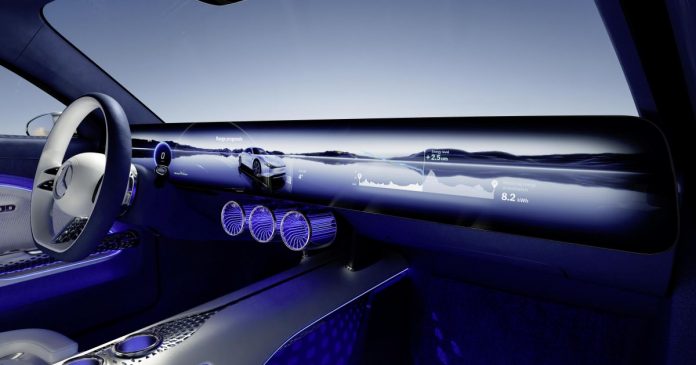Mercedes-Benz has partnered with software company Unity Technologies to power the infotainment elements in its upcoming Mercedes-Benz Operating System (MB.OS).
Unity says its software engine will give future Mercedes-Benz vehicles infotainment displays with “stunning graphics and interactivity with speed and performance”.
Industry Technologies is best known for developing the game engine used in Pokémon Go, Monument Valley and Cuphead. The latter of these games has been ported to the Tesla infotainment system and can be played in the car.
The US-based software company also develops “real-time 3D” technology that’s used in a range of design and engineering, manufacturing, sales and marketing, and service and operations applications.
-
Vision EQXX
Mercedes-Benz AG developers will use Unity Industrial Collection to create the user interface (UI) and user experience (UX) for the MB.OS Human Machine Interface (HMI), which is another term for instrument cluster and infotainment screen.
This new infotainment operating system was previewed with the Mercedes-Benz Vision EQXX electric research prototype.
Unity Technologies was chosen by Mercedes-Benz as its HMI developer platform of choice “following a rigorous, comprehensive evaluation process against competing real-time 3D and HMI development solutions”.
It’s believed one of the competitor companies Mercedes-Benz looked into was Epic Games with its Unreal Engine which is going to power future Volvo infotainment systems.
Unity Technologies says its “leadership in real-time 3D development” will allow Mercedes to potentially implement 3D avatars that can act as “digital butlers”, along with 3D maps, and artificial intelligence (AI) that can change vehicle settings.
The first Mercedes-Benz vehicles running MB.OS will debut in 2024. It will eventually populate throughout the rest of the Mercedes-Benz range.
The first vehicles featuring MB.OS will be built on the new MMA small car platform, which is going to underpin four new vehicles.
This new platform may be the last to be introduced with the option of internal combustion power, as from 2025 onwards Mercedes-Benz has said all new platforms will be electric-only.
These other electric platforms include the MB.EA architecture for medium to large vehicles, AMG.EA for performance cars, and VAN.EA for vans.
In addition, Mercedes-Benz has previously confirmed it’s going to be trimming the number of small models its offers while releasing more high-end vehicles as it targets higher margins.
The company says it anticipates “disproportionate growth” in what it calls its Top-End vehicle segment, citing a 40 per cent increase in S-Class sales last year plus “record” Mercedes-Maybach sales.
This internal segment comprises all Mercedes-AMG and Mercedes-Maybach vehicles, as well as the G-Class and essentially everything with an S: GLS, EQS, EQS SUV and S-Class.
Mercedes-Benz is also going to cut its range of Entry Luxury models from seven to four, though it isn’t leaving this part of the market.
The company says these changes will “reposition Mercedes-Benz in the segment, honing in more precisely on the wishes of discerning customers”.
Mercedes-Benz also still plans to go EV-only by 2030, albeit with the “wherever market conditions allow” disclaimer, and aims to be CO2-neutral by 2039.
MORE: Mercedes-Benz debuting new small car platform in 2024
MORE: Mercedes-Benz plans top-end push, Mythos sub-brand, Maybach SL

